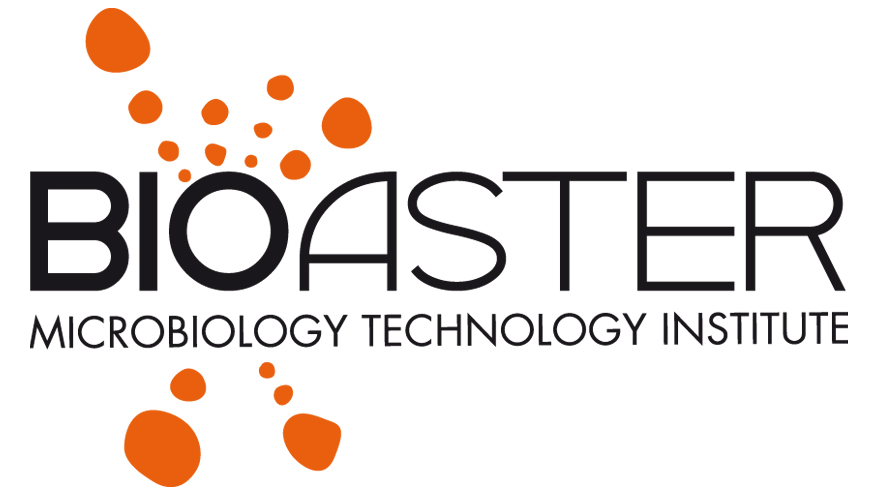Bioaster
keyboard_backspaceBack to Home
Contact
40 Avenue Tony Garnier
69007 Lyon
France
Business Development Manager
About us
BIOASTER is a Technological Research Institute (IRT) that is dedicated to the study of microbiology and infectious diseases, tackling diseases caused by bacteria, viruses, parasites, and fungi. We offer a new approach to R&D, by integrating the principal scientific and technological disciplines, to better share the risks of innovation.
Business offer
Since its inception in 2012, BIOASTER has been continuously investing in technologies aimed at overcoming technological obstacles relating to samples and advanced data analyses. In practice, this involves:
- * Providing access to every type of clinical and biological samples,
- * Providing cutting-edge scientific and technological expertise in the fields of microbial genetics, protein engineering, and bacteriology (aerobic & anaerobic),
- * Managing the selection, identification, phenotyping, and molecular characterization of bacterial strains,
- * Prototyping and generating integrated solutions in the fields of biosensors, immuno-monitoring, microsystems and microfluidics, and optics and computational microscopy,
- * Customizing systems, such as sample processing, liquid handling, signal generation and amplification, signal processing, and data analysis to achieve the objectives of the project,
- * Applying cross-cutting data management approaches all along the value chain between raw data and actionable knowledge.
- * deploying innovative data science & artificial intelligence techniques to perform integrated analyses of complex, multi-source data for the benefit of systems biology and translational medecine studies.
Activities
- Research Unit
- Infectiology
- Immunology
- Inflammation
- Other
- Target selection & validation
- Gene / protein discovery
- bioinformatics design
- Expression and pathway analysis of target
- quantification of target
- Assay development in in-vitro & in-vivo models
- Research exploratory companion biomarkers
- Immunotherapy lead generation
- Binding & Affinity
- Potency & Specificity
- Epitope mapping
- Functional effects
- ADCC, ADCP & CDC
- Antigen density target
- Internalization
- Pharmacology & Biological activity
- PK/PD bioavailability
- Mode of Action
- Therapeutic efficacy
- Safety
- Immunogenicity
- Immunotoxicology
- Specificity
- Manufacturability
- Production quality
- Cell activation
- Avidity testing
- Cell-based activation (APCs, AAPCs)
- Bead-base activation
- Antibody-based activation
- Ex-vivo activation (cell transfer)
- Immunotherapy lead optimization
- Proof of concept
- Pharmacology potency
- in-vitro & ex-vivo models
- in-vivo models
- Preclinical biomarkers
- Research exploratory Companion biomarkers
- Bioinformatics design
- Bioinformatics prediction & analysis
- Animal biomarkers
- Human biomarkers
- Predictive biomarkers
- Treatment efficacy
- Population stratification
- Risk/benefit profile
- Disease progression / follow-up
- CMC
- Master Cell Bank
- Cell Line development
- Clone selection
- Cell Culture
- Media composition
- Bioreactor conditions
- Gene modification / Transduction
- Retroviral & lentiviral vectors
- Bioproduction
- Batches production type
- Mammalian
- Insect
- Yeast
- Bacterial
- Pilot Batches
- Tests
- Optimization
- Process optimization & validation
- Volume
- Preclinical / Tox
- Quality assurance, quality control & analytical process
- Cell line analytical development
- Viral clearance
- Clinical biomarkers
- Predictive biomarkers
- Treatment efficacy
- Population stratification
- Risk/benefit profile
- Disease progression / follow-up
- Safety
- PK/PD features
- Surrogate markers
- Disease progression monitoring
- Companion biomarkers
- Pharmacology
- Treatment efficacy
- Treatment monitoring
- Toxicity
- Bioproduction engineering
- Cell Expansion
- Process optimization
- Biomarker Identification
- Research exploratory Companion biomarkers
- Bioinformatics design
- Bioinformatics prediction & analysis
- Ex Vivo & In Vivo Strategy
- Ex Vivo & In Vivo Strategy
- Antigen identification, selection, optimization, and validation
- Omics analysis
- In silico modeling
- Structure-based antigen design
- Reverse vaccinology
- Epidemiology analysis
- Assay development with in-vitro & in-vivo models
- Antigen selection: pathogen sequencing and functional antigens
- Immunogenicity in relevant animal models
- Pathogen-host knowledge
- Pathogen genetics and mechanism of action
- In-vivo expression during pathogen cycle
- Host interaction (infection mechanisms)
- In-vitro and in-vivo models
- Antigen-protective immune-response profile
- Humoral response characterization:
- Antibody dosage
- Functional antibody assays (neutralization, CDC, ADCC)
- Other serological assays
- Cell mediated immunity response
- T cell assays
- Reactogenicity Assessment
- Research exploratory biomarkers
- efficiency vaccination
- protection correlation
- CMC
- Cell Culture / Fermentation
- media formulation and supply
- Bioreactor conditions (cell in suspension, adherent cell player)
- Ability to work in BSL2 conditions
- Formulation
- Formulation
- Adjuvants
- Quality control & analytical process monitoring
- Biosafety & Bioanalysis
- Immune response characterization
- Viral safety
- Bioproduction analytical monitoring
- Key and critical process parameters (KCP, CPP)
- Identification
- Monitoring



